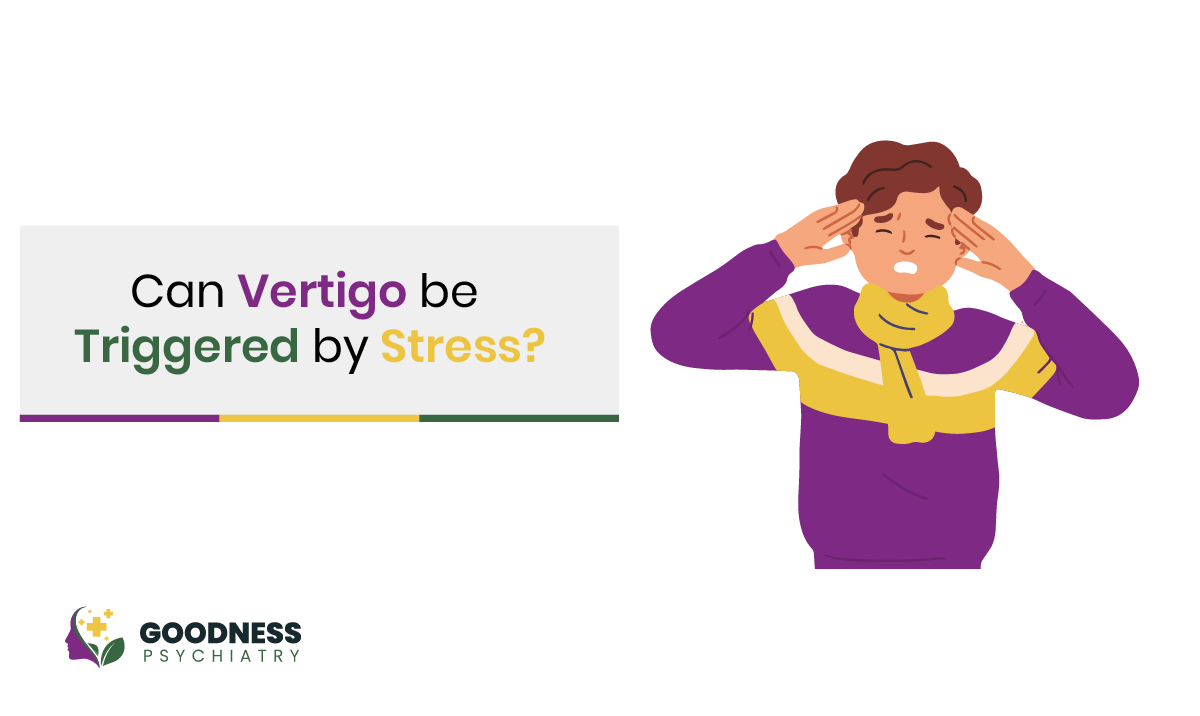Imagine being at the desk on your way to finishing your homework when you find out the room is spinning. Your abdomen turns, and you take the table with you to prevent your fall. That awful experience is called vertigo, and anyone can have it. Daily stress, like worrying about a test or arguing with a friend, can make you uneasy. This discomfort can also cause dizziness. We will answer the big question: Can vertigo be triggered by stress? We will show how stress affects our bodies. We will share easy ways to reduce this suffering. Also, we will explain who can help us. Let’s explore!
Stressed and dizzy? Goodness Psychiatry helps you regain balance and ease anxiety-driven vertigo. Let’s steady your world together! Contact us today.
What Is Vertigo? (And Why Does Stress Matter?)
When you have vertigo, the world doesn’t spin to one side or swirl around. It feels much worse than that. It is like going round and round on a carousel while at rest. The condition can be there for a few seconds to hours. Some individuals may also feel nauseated or have difficulty with their balance.
Now, “can vertigo be triggered by stress?” Absolutely! Stress can cause dizziness, especially in those who are already sensitive. It doesn’t happen in every episode, but it can trigger symptoms. Picture stress as a match in a tinder-dry forest, it only takes a flicker to start a raging fire.
How Stress and Vertigo Are Connected
Stress puts your body in a state like it’s facing immediate danger. Stress triggers rapid heartbeats, tense muscles, and cortisol hormone release from your brain. Through what process does stress result in vertigo?
- The Inner Ear Problem: Your balance is regulated by tiny organs in the inner ear. Tension can disrupt these organs, and they send the brain the wrong signals.
- Muscle Tension: Tension causes the neck and shoulder muscles to become stiff. This will reduce the blood flow to your brain, thus, picture dizziness would be as bad as it is.
- Anxiety Loop: The feeling that results from spinning can lead to the beginning of anxiety, a condition that makes people hand over to the sense of dizziness. It seems like a hamster wheel from which you cannot get away!
Stress Ear Pain: A Clue You Might Miss
Have you ever felt ear pressure or ringing when stressed? This is called stress ear pain. It happens because stress inflames nerves and muscles around your ears. Stress could be the culprit if your ears hurt and you feel dizzy.
What to do:
- Rest in a quiet, dark room.
- Try a warm compress over your ears.
- Avoid loud noises until the pain eases.
Can High Cortisol Cause Dizziness? The Science
Cortisol is your body’s “alarm system” hormone. But when stress keeps cortisol high for too long, it can:
- Damage blood vessels in your inner ear.
- Confuse your brain’s balance center.
- It makes you feel tired and foggy.
So, can high cortisol cause dizziness? Yes! Managing stress isn’t just good for your mood, it protects your balance.
Surprising Triggers: Can Caffeine Affect Vertigo?
Coffee, soda, and energy drinks might seem helpful, but caffeine can:
- Boost anxiety (making stress worse).
- Dehydrate you (dizziness loves dehydration!).
- Ruin your sleep (poor sleep = more vertigo).
Try this instead: Drink water, herbal tea, or fruit-infused water. Your inner ear will thank you!
Does Alcohol Make Vertigo Worse? The Truth
Alcohol might help you relax, but it’s a sneaky trigger. Here’s why:
- It dehydrates you (again, bad for dizziness).
- It harms the inner ear’s balance sensors.
- It disrupts sleep, leaving you tired and shaky.
Pro tip: If you’re battling vertigo, skip alcohol for a few weeks. See if your symptoms improve!
How to Calm Stress-Related Vertigo
You don’t have to live with spinning spells! Try these steps:
Step 1: Breathe Like a Pro
- Sit comfortably.
- Inhale slowly for 4 seconds.
- Exhale for 6 seconds.
- Repeat for 5 minutes.
Step 2: Move Gently
- Yoga, walking, or stretching boosts blood flow.
- Avoid quick head movements (they can trigger dizziness).
Step 3: Fix Your Sleep
- Aim for 8–9 hours nightly.
- Keep screens out of the bedroom (blue light messes with sleep).
Step 4: Eat Balance-Friendly Foods
- Drink water (dehydration = dizziness).
- Eat bananas (they help regulate fluids in your inner ear).
- Avoid salty snacks (salt worsens inner ear pressure).
When to Call a Doctor
Most stress-related vertigo is harmless, but see a doctor if:
- Dizziness lasts hours or happens daily.
- You have hearing loss or severe stress ear pain.
- You feel confused, have slurred speech, or have chest pain (this could be a more significant issue).
Kids and Stress: Can Children Get Vertigo Too?
Yes! Kids juggle school, sports, and friendships—all stressful. Signs your child might have stress-related vertigo:
- Complaints of “spinning” or “the room moving.”
- Clumsiness or trouble focusing.
- A newfound fear of playgrounds and heights can take children by surprise.
How to help: Introduce kids to calming breathing techniques. Encourage plenty of outdoor playtime, where adventure awaits.
Conclusion
Can vertigo be triggered by stress? Absolutely. But now you know how to fight back! Tame the tides of vertigo by mastering the art of stress management. Avoid enemies like caffeine and alcohol. They can trigger symptoms. Listen to your body’s whispers, they hold essential secrets. Remember, you’re not navigating this voyage solo. Even tiny shifts can create monumental transformations!
FAQs
Can you get vertigo from stress even if you’re healthy?
Yes! Even healthy people can have stress-triggered vertigo if their inner ear is sensitive.
Does stress ear pain mean I have an infection?
Not always. Stress and ear pain often come without fever or fluid. Rest and calm usually help.
Is vertigo permanent?
No! Most people recover fully with rest, stress management, and treatment.

